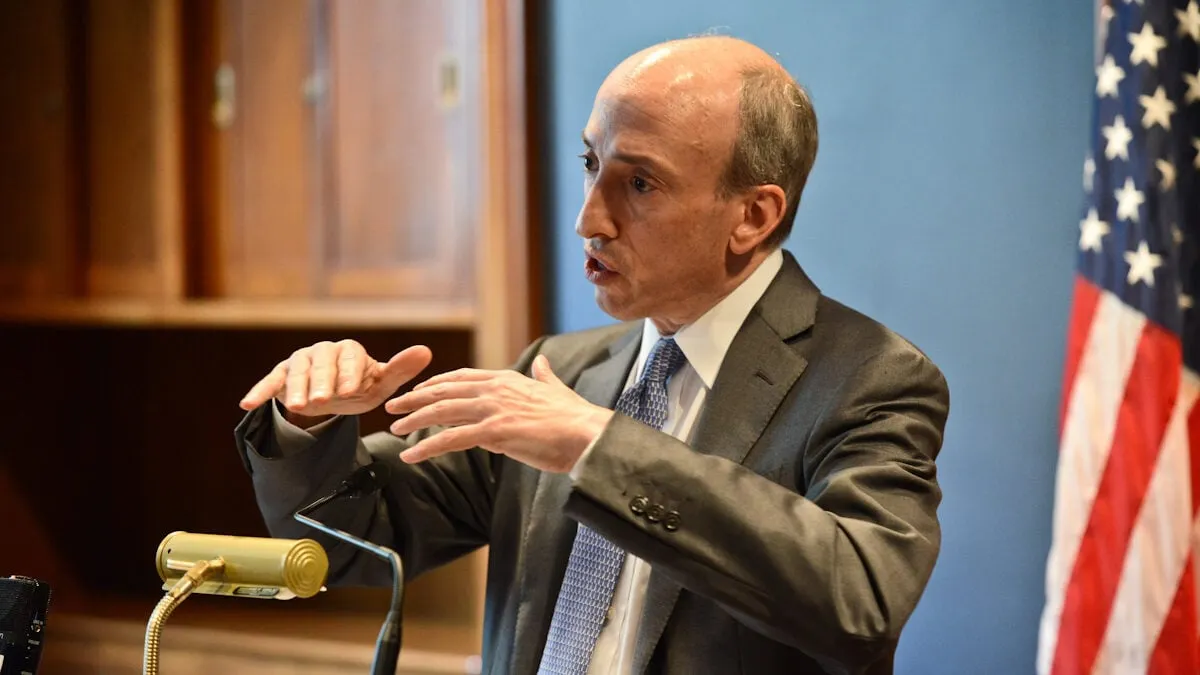The crypto industry was again left emptyhanded in its long campaign to get straight answers from federal regulators, as the Securities and Exchange Commission today adopted rules that widen the net of entities that need to register with them. While the hundreds of pages could be read as applying to cryptocurrency and digital assets, the word "crypto" appears only once. In a footnote.
The SEC's modifications are historic, updating the Securities Exchange Act of 1934 to identify certain activities that would cause persons engaging in such activities to be “dealers” or “government securities dealers,” and defining what it means to be doing so “as a part of a regular business.”
“These measures are common sense,” SEC Chair Gary Gensler said in prepared remarks. “Congress did not intend for registration and regulatory requirements to apply to some dealers and not to others.”
Gensler said that the update “requires that firms that act like dealers register with the commission as dealers, thereby protecting investors as well as promoting market integrity, resiliency, and transparency."
Whether and how cryptocurrency businesses fit into these definitions, however, remains unclear. The phrase crypto, and references to any digital asset that is a security, was left out of the main narrative of the rulemaking document—even after strong demands for crypto's inclusion were made by industry players when the rule changes were first proposed nearly two years ago.
"The SEC chose to expand the scope of the proposals to market participants in the digital asset space solely by way of a single reference in Footnote 36 to the proposals without any additional discussion or analysis," said Perianne Boring, founder and CEO of the Chamber of Digital Commerce, in submitted comments.
In its comment letter, the Chamber of Digital Commerce said that the SEC had again failed to provide clear guidance on when a digital asset constitutes a security.
"Despite repeated requests from digital asset market participants over a growing number of years, the commission has yet to provide specific rules setting forth when a digital asset constitutes an ‘investment contract,’ making it difficult for issuers, trading platforms, and other market participants to make that determination,” the letter said.
The Association for Digital Asset Markets (ADAM) raised similar concerns in its comment letter.
"If, in fact, the commission intends for the proposals to expand the commission’s authority over digital asset intermediaries, it is the commission’s duty to make that expansion of its scope clear, and to request comment on that concept," ADAM said.
ADAM also said the SEC's economic analysis is flawed because it does not consider the impact on the digital asset industry.
"The commission’s economic analysis... provides absolutely no analysis of the impact of extending the definition of ‘dealer’ to encompass digital asset market participants, instead focusing solely on the impact that the proposed rules would have on private funds and propriety trading firms operating in the U.S. Treasuries space and publicly listed equity securities market segments," the letter said.
Meanwhile, the Global Digital Asset & Cryptocurrency Association (GDCA) took issue with how the SEC notified stakeholders of its plans, saying that the agency never explicity said it intended to regulate digital assets through the dealer definition—which the group claims circumvent requirements of the separate Administrative Procedure Act.
"The commission appears to be attempting to extend the scope of the proposals to digital asset participants without any express discussion or analysis, and the proposals appear to circumvent the Administrative Procedure Act’s notice and public comment requirements by, for example, inadequately stating the scope and intended asset classes that would be covered by the proposals," the GDCA said.
Beyond that, the GDCA joined the chorus of voices looking for clarification for digital asset market participants.
"We respectfully request that the commission specifically address whether or not the proposals encompass any digital asset market participants, and, if so, provide an express analysis of that fact as well as examples of the types of digital asset participants that it believes would be required to comply with the proposed rules," the letter said.
The rules define certain activities like routinely expressing trading interest at or near the best available prices on both sides of the market that would cause a person to fall under the dealer definition. The GDCA said the guidelines are unclear.
"The qualitative standards that the commission proposes are vague and will lead regulators to apply them in an inconsistent manner," the GDCA said.
Despite years of calls for clear crypto rules, Gensler has consistently maintained that existing laws apply and are clear, and that crypto companies are welcome to register with the SEC under them. How to do so has never been articulated, however.
The final rules will become effective 60 days after publication in the Federal Register. The compliance date for the final rules will be one year after the effective date.
Editor's note: This story was drafted with Decrypt AI from sources referenced in the text, and fact-checked by Ozawa.

